Events
| Name | organizer | Where |
|---|---|---|
| MBCC “Doing Business with Mongolia seminar and Christmas Receptiom” Dec 10. 2025 London UK | MBCCI | London UK Goodman LLC |
NEWS
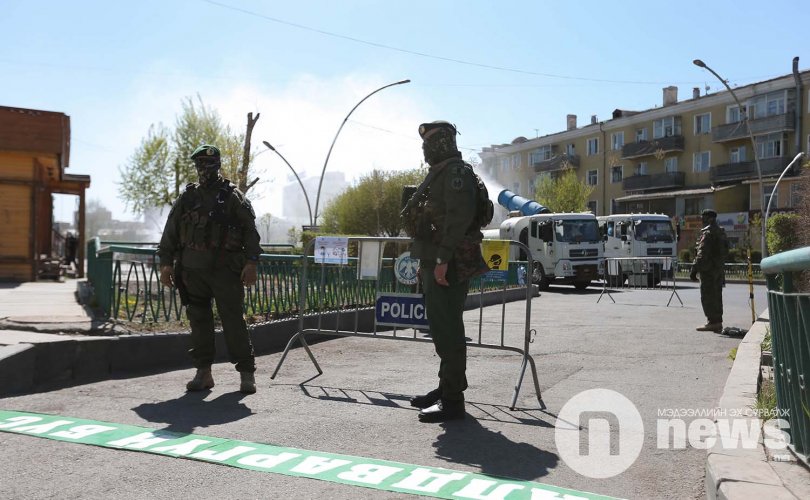
Mongolia recorded a record of 1,220 new daily cases, 2 deaths www.akipress.com
Mongolia recorded a record of 1,220 new daily cases of COVID-19 after 10,220 PCR tests conducted nationwide, the Health Ministry said on April 14.
1,106 cases were registered in Ulaanbaatar, the rest were confirmed in the regions.
The total number of coronavirus cases has reached 17,823.
10,253 patients recovered, with 366 in the last 24 hours.
2 deaths linked to the coronavirus occurred during the past day, a 44-year-old and a 49-year-old persons died.
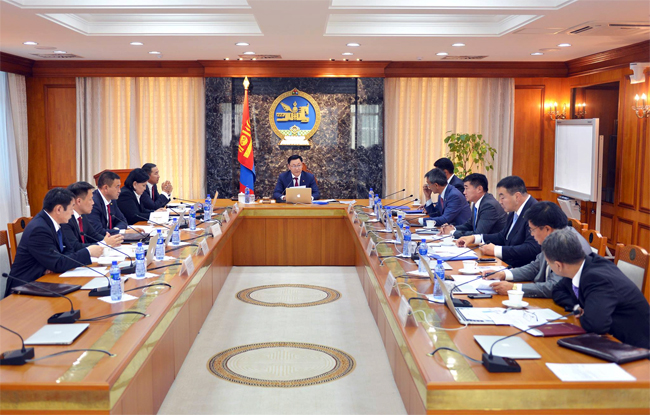
Cabinet meeting news in brief www.montsame.mn
Following decisions were made at the Cabinet meeting today, April 14:
- Minister of Food, Agriculture and Light Industry was tasked to establish an on-lending loan agreement of ‘Tractors and other agricultural equipment and machinery supply project’ within the framework of Mongolia-Belarus Intergovernmental General Agreement on the Provision of Export Loan, in line with relevant laws and regulations.
- The Cabinet members heard 2020 general report of Mongolian Land Unified Fund and implementation progress of the general plan for State Land Management respectively.
- The Cabinet discussed the 2022 budget framework statement, draft bill on budget assumption for 2023-2024 and a revised bill on Digital Signature respectively and decided to submit them to the Parliament.
- The Cabinet also discussed a draft parliamentary resolution on measures to protect security of the Mongolians’ gene pool and support population growth, initiated and developed by MP G.Temuulen, and agreed to combine recommendations for the draft resolution and convey them to the initiator.
In addition, Deputy Prime Minister and Head of the State Emergency Commission S.Amarsaikhan briefed current situation of the COVID-19 pandemic and ongoing responsive measures.

FRC warns not to receive electronic payment, remittance services from non-licensed entities www.montsame.mn
The Asia/Pacific Group on Money Laundering is a FATF-style regional inter-governmental body, and Mongolia, as a member, is committed to implement international standards against money laundering, and the financing of terrorism.
Recommendation 14 of FATF states that natural or legal persons that provide money or value transfer services are required to be licensed or registered. According to Paragraph 7.1.6 of the Law on Non-Bank Financial Activities, non-bank financial activities must include electronic payment, remittance services. In the case of operating without a license, penalties are as stated in the Paragraph 11.6.1 of Law on Infringement.
To prevent reduce potential risks to the public, the Financial Regulatory Commission of Mongolia regularly updates lists of entities providing electronic payment and remittance services, and publicly announces this on its website.
As of the first quarter of 2021, the following entities were operating with licenses.
“Ard Credit NBFI” JSC
“Business Invest Development NBFI” LLC
“Gumuda Finance NBFI” LLC
“Gyals Credit NBFI” LLC
“Digital Market NBFI” LLC
“GSB Capital NBFI” LLC
“ESA Finance NBFI” LLC
“Invescore Wallet NBFI” LLC
“Investos NBFI” LLC
“Ireedui Invest NBFI” LLC
“Ikh Mongol Credit NBFI” LLC
“Creditech CTM NBFI” LLC
“LendMN NBFI” LLC
“Mobifinance NBFI” LLC
“MoneyPolo NBFI” LLC
“Naransansar NBFI” LLC
“Netcapital Financial Corporation NBFI” LLC
“Oortsog Khundy NBFI” LLC
“Ochir Undraa OMZ NBFI” LLC
“Public Credit NBFI” LLC
“Prime Financial Holdings NBFI” LLC
“Sain Finance and Transfer NBFI” LLC
“Sam Nor NBFI” LLC
“Solomon Investments NBFI” LLC
“Songomol Finance NBFI” LLC
“SendMN NBFI” LLC
“T-Finance NBFI” LLC
“Tugmel NBFI” LLC
“Financial Triple Group NBFI” LLC
“Khatan Suld NBFI” LLC
“Khymort Naiman Sharga NBFI” LLC
“Central Capital NBFI” LLC
“Shine Tugrug NBFI” LLC
“Exclusive Change NBFI” LLC
“MPSC NBFI” LLC
The FRC of Mongolia warns not to receive electronic payment and remittance services from entities without licenses and prospective customers have to check license of entities before receiving such services, and protect themselves from becoming victim.
Source: Financial Regulatory Commission

Government pays off Mazaalai bond www.montsame.mn
The Ministry of Finance has reported that the final USD 132.6 million repayment of the USD 500 million, 5-year maturity, 10.875 percent interest rate ‘Mazaalai’ bond the Government of Mongolia issued on the international financial market in 2016 was made on April 6, 2021, and the final USD 60 million repayment of the USD 250 million commercial loan borrowed from Credit Suisse Bank in 2016 was made on March 15, 2021.
The Government of Mongolia is implementing the ‘Government Debt Management Strategy for 2019-2022’ approved by Resolution No. 55 of the State Great Hural in 2019.
The first objective of the strategic document is “to make repayments of the government’s domestic and foreign held securities and loans without burdening the economy and state budget and reduce refinancing risks”. Accordingly, the Government of Mongolia took the ‘Nomad’ debt management measure in 2020 and refinanced some portions of the ‘Mazaalai’ bond that was to be repaid in 2021 and ‘Chinggis’ bond to be repaid in 2022. Subsequently, a portion of the Mazaalai bond with a high-interest rate of 10.875 percent was refinanced with a 5.125 percent low-interest-rate ‘Nomad’ bond, and Mongolia successfully repaid the remaining USD 139.8 million (including interest payments) without macroeconomic, budgetary, and financial burdens.
The Ministry of Finance has regularly provided investors of the Mongolian government’s foreign-held securities with information on Mongolia's social and economic situation, and has organized investor meetings two to three times every year with foreign investment banks, strengthening investors’ confidence in Mongolia and enhancing the government’s reputation on the international stock market.
Moreover, as a result of the regular provision of accurate information to credit rating agencies aimed at improving the country’s credit rating, Moody's upgraded Mongolia's outlook to B3 stable from B3 negative. The external debt burden is projected to steadily decrease as a result of the government’s debt management and further actions.
The Government of Mongolia is paying special attention to making outstanding payments of foreign held securities in the coming years with the least economic and budgetary burdens by strengthening its short- and medium-term macroeconomic and fiscal policies, improving the macroeconomic outlook through successful debt management, and boosting investors’ confidence.
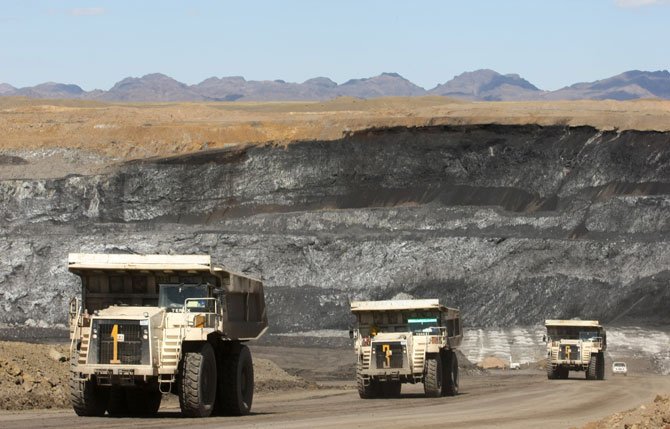
First stage trading of Erdenes Tavantolgoi bond successfully completed www.montsame.mn
For the first time in Mongolia, Erdenes Tavantolgoi JSC has announced the issuance of ‘ETT Bond’ with a total value of up to MNT 2 trillion in three stages as part of the ‘MNT 10 trillion Comprehensive Plan for Economic Recovery’ under implementation by the Government of Mongolia.
The bond issuance is aimed to implement major projects such as the Tavan Tolgoi Thermal Power Plant, Coal Processing Plant, Water Supply Plant, and Railway and finance working capital.
The first phase was successfully organized by opening a trade worth MNT 600 billion on March 30, 2021, and closed on April 9, 2021 at 17:00.
Within the framework of the primary market trading and financing program, a total of MNT 677.7 billion of orders were submitted by stakeholders and fully met planned target.
964 business entities and individuals participated in the trading and raised MNT 336.6 billion with 10% interest rate and 119.7 million USD with 6.3% -6.8% interest rate.
These capitals raised by hundreds of Mongolian citizens, businesses and several banks and are expected to make a significant contribution to the company's future growth and development in Mongolia.

Facebook launches We Think Digital Program in Mongolia to cultivate responsible digital citizens www.news.mn
Today, Facebook launched We Think Digital, a multi-phased awareness and educational campaign to help Mongolia internet users navigate the online world safely and responsibly, and cultivate responsible digital citizens with complete digital literacy. Created in partnership with Faro Foundation, Mongolia’s Ministry of Education and Science, and Communication and Information Technology Authority. We Think Digital features a wide range of online and offline initiatives over the course of this year, including free online training webinars, and educational content on the We Think Digital website. The program aims to train 10,000 local digital citizens by the end of the year.
As a response to the urgent need for stronger digital literacy and digital citizenship, Facebook is bringing the global program “We Think Digital” to Mongolia for the first time. The program aims to teach people how to navigate their privileges and obligations in today’s evolving digital space, how they should decipher and share information online, and most importantly, how they should interact with other people in online communities. Facebook’s We Think Digital Program is the expansion of Digital Literacy Library, which was also developed by Facebook and launched in Mongolia in 2019. We Think Digital is an extensive training program composed of eight modules covering topics such as digital citizenship, online safety, hate speech and bullying, privacy and cyber security, as well as misinformation.
Picture 1. Director of Public Policy at Facebook George Chan
“We know our job is never done when it comes to online safety, and we will continue to build better tools, improve our policies, and partner with experts to ensure our platforms offer a safe and positive experience for our community,” said George Chen, Director of Public Policy at Facebook. “The launch of We Think Digital in Mongolia today shows our long-term commitment in people, technology, programs and partnerships, such as reducing the spread of misinformation and minimizing incidences of online harassment, to keep our communities closer together.”
Picture 2. Prime Minister of Mongolia L. Oyun-Erdene
To commemorate the launch of the program, Facebook and its partners will hold a series of online webinars. For which, the Prime Minister of Mongolia L. Oyun-Erdene sent his regards and quoted, “We are excited for Facebook to launch its We Think Digital Program in Mongolia today. Mongolia has prioritized digital transformation this year, and this implementation is much timely as the government sought to foster digital literacy in its education system. We extend our sincerest appreciation to Facebook for this imperative investment for our people. I am confident that we will continue collaborating with Facebook in many other ways to support Mongolia’s economic and social development.”
Picture 3. Chairwoman at Communication and Information Technology Authority B. Bolor-Erdene
PM L. Oyun-Erdene officially delegated Chairwoman at Communication and Information Technology Authority B. Bolor-Erdene to represent the Government of Mongolia and quote him during the event.
Apart from Faro Foundation, Facebook is also proud to have many supporting organizations for We Think Digital launch in Mongolia, including Faro Foundation, Ministry of Education and Science, Communication and Information Technology Authority, UNICEF and Fact Check Mongolia.
We Think Digital webinars
Starting from April 14, 2021, Facebook will host a series of live webinars covering relevant topics. Each webinar will feature advice and tips from industry leaders, experts, educators and key opinion leaders to empower everyone to become a more informed and responsible digital citizen.
The first webinar will broadcast on April 4 at 1 P.M., hosting a representative of the Prime Minister of Mongolia L. Oyun-Erdene for opening remarks, followed by a panel discussion on “Digital Citizen” with four renowned community and industry leaders who will discuss the basics of what it means to hold a digital citizenship, and relevant topics to Mongolia’s digital transformation.
The second webinar will be on April 28 at 1 P.M. and the guest of honor will be the Mongolian Minister of Education and Science L. Enkh-Amgalan, followed by a panel discussion on “Online Safety”.
The webinar will be held on May 12 at 1 P.M. with opening remarks delivered by the U.S. Ambassador to Mongolia, His Excellency Michael S. Klecheski, followed by a panel discussion on “Misinformation”.
And the final webinar will be held on May 26 at 1 P.M. with the Guest of Honor Chairwoman at Communication and Information Technology Authority B. Bolor-Erdene, followed by a panel discussion on “Online Privacy”.
All webinars can be viewed on the We Think Digital Mongolia Facebook Page.
Picture 4. From the right: A.Byambajargal, B.Ider-Od, B. Bolor-Erdene, P. Nayar-BayarOnline resources on wethinkdigital.fb.com
In collaboration with experts, academics, non-governmental organizations and civil society organizations, Facebook has designed a set of modules and resources for educators and members of the public to download for free. To download the resources, please visit: https://wethinkdigital.fb.com/mn/mn-mn/resources/.
Trainings for the Public
From April to May, Facebook will implement a Digital Literacy program to provide training and support for teachers to implement digital literacy lessons at their own schools. The program is also open to the public. Stay tuned for more details through We Think Digital Mongolia Facebook Page.
For more information, please visit: https://wethinkdigital.fb.com/mn
Media contacts:
Facebook’s lead partner for We Think Digital in Mongolia:
Byambajargal Ayushjav, Country Representative of Facebook and Founder of Faro Foundation Mongolia
byambajargal@faro.mn
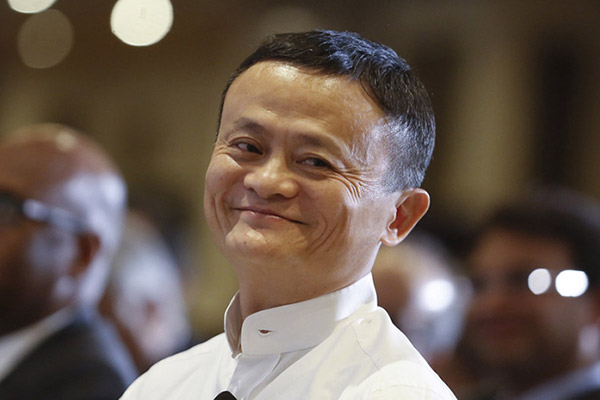
Jack Ma becomes over $2 billion richer in 1 day after record Alibaba fine www.rt.com
A multibillion-dollar fine slapped on Alibaba by Chinese regulators has given a huge boost to the e-commerce giant’s shares, and to the fortune of founder Jack Ma.
Hong Kong-listed shares of Alibaba have rallied for two days in a row. After a strong opening in Hong Kong on Tuesday, they were up nearly 0.5% later in the day, adding to gains of more than 6% on Monday. The company’s US-listed shares surged more than 9% on Monday, marking the biggest growth in almost four years.
The founder of the online giant, Jack Ma, gained from the rally. According to the Bloomberg Billionaires Index, his net worth grew by $2.3 billion to hit $52.1 billion. He is currently the 25th richest man in the world, and the third richest person in China.
Over the weekend, China’s market regulators imposed an 18.2 billion yuan ($2.8 billion) fine on Alibaba, which amounts to 4% of the company’s revenues in 2019. Despite the penalty being the highest of its kind on record, it’s still better than the maximum possible under Chinese law.
The authorities ruled that the online giant was involved in anti-competitive practices, forcing merchants to avoid rival e-commerce platforms. Alibaba immediately accepted the fine, promising to ensure a more open operating environment for its merchants and partners.
Just two days after Alibaba was fined, another crown jewel of Jack Ma’s business empire, fintech company Ant Group, was ordered to restructure as a financial holding company. The move could affect investor interest in the firm and may have an impact on its attempt to go public. Ant’s IPO, which could have been the biggest in history, was abruptly halted last year over regulatory concerns.
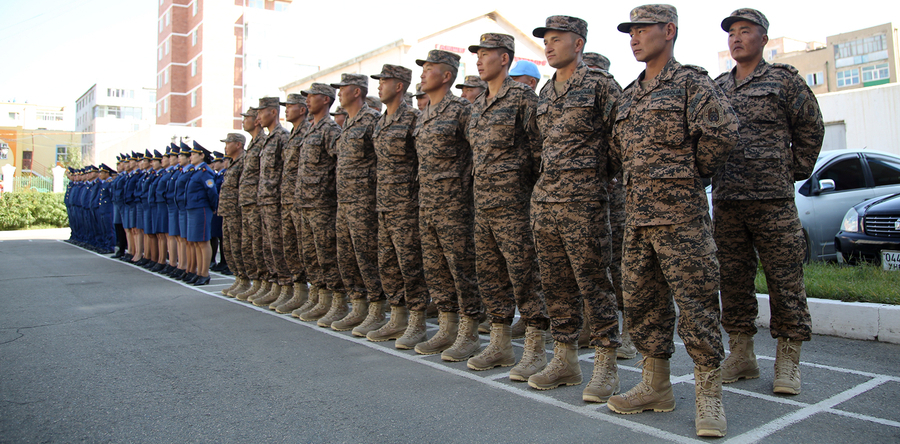
Mongolian peacekeepers treat and evacuate wounded after cattle raid attack near Mayom www.reliefweb.int
Together with local authorities and the South Sudan People’s Defence Forces, a group of 19 Mongolian peacekeepers based in Mayom recently treated and evacuated 27 persons who were wounded during a cattle raid claiming several lives.
The attack, which according to local sources claimed at least 19 lives, reportedly took place in Bouda, Warrap State, near Majok River and Unity State.
Receiving information about the violent cattle raid, peacekeepers based in the temporary operating base in Mayom sprang into action and went to the area of the attack to monitor the situation.
Together with the Mayom County Commissioner James Chuol Gatluak and Brigadier General Ajang, the Mongolians left their base shortly before 8 in the morning and reached the Majok River about three hours later.
“We could not cross the river by car, but with armed personnel carriers from the South Sudan People’s Defence Force wounded survivors could be taken across for medical first aid by us and doctors from the Ministry of Health,” recounted Major Gantumur Badrakh, one of two Mongolian officers in charge of the operation.
It took a total of six hours to transport all the wounded survivors to the side of the river where emergency medical care could be given.
“Among the 27 wounded persons, at least five were young girls aged between 6 and 16 years, with two of them in a critical condition. Most of the injured were women, children and youth,” said Major Tuvshinjargal Erdenebileg, the other Mongolian officer commanding the UN troops, adding that the number of casualties was expected to increase.
All patients were taken to the hospital in nearby Mankien for further treatment.
The United Nations Mission in South Sudan has established several temporary operating bases in particularly conflict-prone locations across the country. The presence of peacekeepers in these areas aims to protect civilians by deterring violence.

Construction of Deluun Boldog airport commences www.montsame.mn
The construction of Deluun Boldog airport in Dadal soum of Khentii aimag has begun on April 9. A local company is executing construction work of the airport from 2021 to 2022.
The Civil Aviation Authority of Mongolia launched plans to upgrade the airport in Dadal soum in 2016 as part of the government’s goal to make Khentii aimag a tourism region. The airport construction that was initially set to begin last fall has been postponed due to COVID-19.
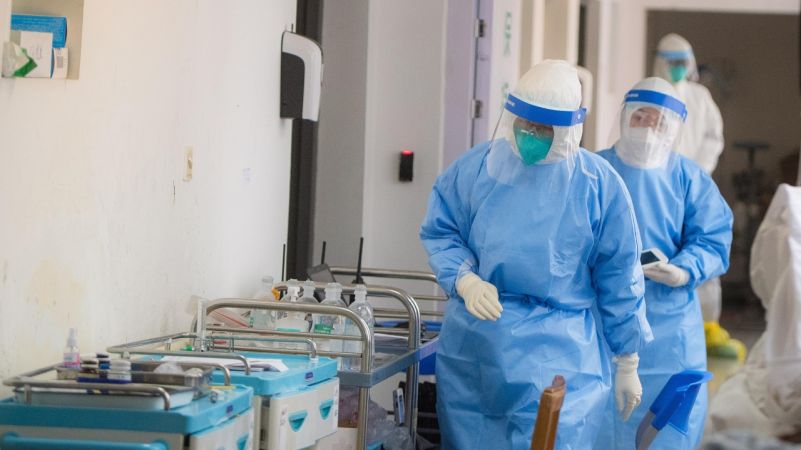
885 new COVID-19 cases and two COVID-19-related deaths reported www.montsame.mn
885 people were tested positive for coronavirus nationwide in the last 24 hours. It means the highest number of cases within a day since the first locally confirmed case was recorded.
Of the newly detected cases, 836 were registered in Ulaanbaatar city, 48 in rural aimags while one hospital transmission case was reported.
As of today, the total number of COVID-19 cases in Mongolia has reached 16,603. In the past 24 hours, 371 people have been discharged from hospital, bringing the number of recoveries to 9,887.
Currently, 2667 people are undergoing treatment, of whom 19 are in very critical health condition. In addition, two men aged 20 and 61 have died from coronavirus, which brings the total number of coronavirus-related deaths in the country to 27.
- «
- 1
- 2
- 3
- 4
- 5
- 6
- 7
- 8
- 9
- 10
- 11
- 12
- 13
- 14
- 15
- 16
- 17
- 18
- 19
- 20
- 21
- 22
- 23
- 24
- 25
- 26
- 27
- 28
- 29
- 30
- 31
- 32
- 33
- 34
- 35
- 36
- 37
- 38
- 39
- 40
- 41
- 42
- 43
- 44
- 45
- 46
- 47
- 48
- 49
- 50
- 51
- 52
- 53
- 54
- 55
- 56
- 57
- 58
- 59
- 60
- 61
- 62
- 63
- 64
- 65
- 66
- 67
- 68
- 69
- 70
- 71
- 72
- 73
- 74
- 75
- 76
- 77
- 78
- 79
- 80
- 81
- 82
- 83
- 84
- 85
- 86
- 87
- 88
- 89
- 90
- 91
- 92
- 93
- 94
- 95
- 96
- 97
- 98
- 99
- 100
- 101
- 102
- 103
- 104
- 105
- 106
- 107
- 108
- 109
- 110
- 111
- 112
- 113
- 114
- 115
- 116
- 117
- 118
- 119
- 120
- 121
- 122
- 123
- 124
- 125
- 126
- 127
- 128
- 129
- 130
- 131
- 132
- 133
- 134
- 135
- 136
- 137
- 138
- 139
- 140
- 141
- 142
- 143
- 144
- 145
- 146
- 147
- 148
- 149
- 150
- 151
- 152
- 153
- 154
- 155
- 156
- 157
- 158
- 159
- 160
- 161
- 162
- 163
- 164
- 165
- 166
- 167
- 168
- 169
- 170
- 171
- 172
- 173
- 174
- 175
- 176
- 177
- 178
- 179
- 180
- 181
- 182
- 183
- 184
- 185
- 186
- 187
- 188
- 189
- 190
- 191
- 192
- 193
- 194
- 195
- 196
- 197
- 198
- 199
- 200
- 201
- 202
- 203
- 204
- 205
- 206
- 207
- 208
- 209
- 210
- 211
- 212
- 213
- 214
- 215
- 216
- 217
- 218
- 219
- 220
- 221
- 222
- 223
- 224
- 225
- 226
- 227
- 228
- 229
- 230
- 231
- 232
- 233
- 234
- 235
- 236
- 237
- 238
- 239
- 240
- 241
- 242
- 243
- 244
- 245
- 246
- 247
- 248
- 249
- 250
- 251
- 252
- 253
- 254
- 255
- 256
- 257
- 258
- 259
- 260
- 261
- 262
- 263
- 264
- 265
- 266
- 267
- 268
- 269
- 270
- 271
- 272
- 273
- 274
- 275
- 276
- 277
- 278
- 279
- 280
- 281
- 282
- 283
- 284
- 285
- 286
- 287
- 288
- 289
- 290
- 291
- 292
- 293
- 294
- 295
- 296
- 297
- 298
- 299
- 300
- 301
- 302
- 303
- 304
- 305
- 306
- 307
- 308
- 309
- 310
- 311
- 312
- 313
- 314
- 315
- 316
- 317
- 318
- 319
- 320
- 321
- 322
- 323
- 324
- 325
- 326
- 327
- 328
- 329
- 330
- 331
- 332
- 333
- 334
- 335
- 336
- 337
- 338
- 339
- 340
- 341
- 342
- 343
- 344
- 345
- 346
- 347
- 348
- 349
- 350
- 351
- 352
- 353
- 354
- 355
- 356
- 357
- 358
- 359
- 360
- 361
- 362
- 363
- 364
- 365
- 366
- 367
- 368
- 369
- 370
- 371
- 372
- 373
- 374
- 375
- 376
- 377
- 378
- 379
- 380
- 381
- 382
- 383
- 384
- 385
- 386
- 387
- 388
- 389
- 390
- 391
- 392
- 393
- 394
- 395
- 396
- 397
- 398
- 399
- 400
- 401
- 402
- 403
- 404
- 405
- 406
- 407
- 408
- 409
- 410
- 411
- 412
- 413
- 414
- 415
- 416
- 417
- 418
- 419
- 420
- 421
- 422
- 423
- 424
- 425
- 426
- 427
- 428
- 429
- 430
- 431
- 432
- 433
- 434
- 435
- 436
- 437
- 438
- 439
- 440
- 441
- 442
- 443
- 444
- 445
- 446
- 447
- 448
- 449
- 450
- 451
- 452
- 453
- 454
- 455
- 456
- 457
- 458
- 459
- 460
- 461
- 462
- 463
- 464
- 465
- 466
- 467
- 468
- 469
- 470
- 471
- 472
- 473
- 474
- 475
- 476
- 477
- 478
- 479
- 480
- 481
- 482
- 483
- 484
- 485
- 486
- 487
- 488
- 489
- 490
- 491
- 492
- 493
- 494
- 495
- 496
- 497
- 498
- 499
- 500
- 501
- 502
- 503
- 504
- 505
- 506
- 507
- 508
- 509
- 510
- 511
- 512
- 513
- 514
- 515
- 516
- 517
- 518
- 519
- 520
- 521
- 522
- 523
- 524
- 525
- 526
- 527
- 528
- 529
- 530
- 531
- 532
- 533
- 534
- 535
- 536
- 537
- 538
- 539
- 540
- 541
- 542
- 543
- 544
- 545
- 546
- 547
- 548
- 549
- 550
- 551
- 552
- 553
- 554
- 555
- 556
- 557
- 558
- 559
- 560
- 561
- 562
- 563
- 564
- 565
- 566
- 567
- 568
- 569
- 570
- 571
- 572
- 573
- 574
- 575
- 576
- 577
- 578
- 579
- 580
- 581
- 582
- 583
- 584
- 585
- 586
- 587
- 588
- 589
- 590
- 591
- 592
- 593
- 594
- 595
- 596
- 597
- 598
- 599
- 600
- 601
- 602
- 603
- 604
- 605
- 606
- 607
- 608
- 609
- 610
- 611
- 612
- 613
- 614
- 615
- 616
- 617
- 618
- 619
- 620
- 621
- 622
- 623
- 624
- 625
- 626
- 627
- 628
- 629
- 630
- 631
- 632
- 633
- 634
- 635
- 636
- 637
- 638
- 639
- 640
- 641
- 642
- 643
- 644
- 645
- 646
- 647
- 648
- 649
- 650
- 651
- 652
- 653
- 654
- 655
- 656
- 657
- 658
- 659
- 660
- 661
- 662
- 663
- 664
- 665
- 666
- 667
- 668
- 669
- 670
- 671
- 672
- 673
- 674
- 675
- 676
- 677
- 678
- 679
- 680
- 681
- 682
- 683
- 684
- 685
- 686
- 687
- 688
- 689
- 690
- 691
- 692
- 693
- 694
- 695
- 696
- 697
- 698
- 699
- 700
- 701
- 702
- 703
- 704
- 705
- 706
- 707
- 708
- 709
- 710
- 711
- 712
- 713
- 714
- 715
- 716
- 717
- 718
- 719
- 720
- 721
- 722
- 723
- 724
- 725
- 726
- 727
- 728
- 729
- 730
- 731
- 732
- 733
- 734
- 735
- 736
- 737
- 738
- 739
- 740
- 741
- 742
- 743
- 744
- 745
- 746
- 747
- 748
- 749
- 750
- 751
- 752
- 753
- 754
- 755
- 756
- 757
- 758
- 759
- 760
- 761
- 762
- 763
- 764
- 765
- 766
- 767
- 768
- 769
- 770
- 771
- 772
- 773
- 774
- 775
- 776
- 777
- 778
- 779
- 780
- 781
- 782
- 783
- 784
- 785
- 786
- 787
- 788
- 789
- 790
- 791
- 792
- 793
- 794
- 795
- 796
- 797
- 798
- 799
- 800
- 801
- 802
- 803
- 804
- 805
- 806
- 807
- 808
- 809
- 810
- 811
- 812
- 813
- 814
- 815
- 816
- 817
- 818
- 819
- 820
- 821
- 822
- 823
- 824
- 825
- 826
- 827
- 828
- 829
- 830
- 831
- 832
- 833
- 834
- 835
- 836
- 837
- 838
- 839
- 840
- 841
- 842
- 843
- 844
- 845
- 846
- 847
- 848
- 849
- 850
- 851
- 852
- 853
- 854
- 855
- 856
- 857
- 858
- 859
- 860
- 861
- 862
- 863
- 864
- 865
- 866
- 867
- 868
- 869
- 870
- 871
- 872
- 873
- 874
- 875
- 876
- 877
- 878
- 879
- 880
- 881
- 882
- 883
- 884
- 885
- 886
- 887
- 888
- 889
- 890
- 891
- 892
- 893
- 894
- 895
- 896
- 897
- 898
- 899
- 900
- 901
- 902
- 903
- 904
- 905
- 906
- 907
- 908
- 909
- 910
- 911
- 912
- 913
- 914
- 915
- 916
- 917
- 918
- 919
- 920
- 921
- 922
- 923
- 924
- 925
- 926
- 927
- 928
- 929
- 930
- 931
- 932
- 933
- 934
- 935
- 936
- 937
- 938
- 939
- 940
- 941
- 942
- 943
- 944
- 945
- 946
- 947
- 948
- 949
- 950
- 951
- 952
- 953
- 954
- 955
- 956
- 957
- 958
- 959
- 960
- 961
- 962
- 963
- 964
- 965
- 966
- 967
- 968
- 969
- 970
- 971
- 972
- 973
- 974
- 975
- 976
- 977
- 978
- 979
- 980
- 981
- 982
- 983
- 984
- 985
- 986
- 987
- 988
- 989
- 990
- 991
- 992
- 993
- 994
- 995
- 996
- 997
- 998
- 999
- 1000
- 1001
- 1002
- 1003
- 1004
- 1005
- 1006
- 1007
- 1008
- 1009
- 1010
- 1011
- 1012
- 1013
- 1014
- 1015
- 1016
- 1017
- 1018
- 1019
- 1020
- 1021
- 1022
- 1023
- 1024
- 1025
- 1026
- 1027
- 1028
- 1029
- 1030
- 1031
- 1032
- 1033
- 1034
- 1035
- 1036
- 1037
- 1038
- 1039
- 1040
- 1041
- 1042
- 1043
- 1044
- 1045
- 1046
- 1047
- 1048
- 1049
- 1050
- 1051
- 1052
- 1053
- 1054
- 1055
- 1056
- 1057
- 1058
- 1059
- 1060
- 1061
- 1062
- 1063
- 1064
- 1065
- 1066
- 1067
- 1068
- 1069
- 1070
- 1071
- 1072
- 1073
- 1074
- 1075
- 1076
- 1077
- 1078
- 1079
- 1080
- 1081
- 1082
- 1083
- 1084
- 1085
- 1086
- 1087
- 1088
- 1089
- 1090
- 1091
- 1092
- 1093
- 1094
- 1095
- 1096
- 1097
- 1098
- 1099
- 1100
- 1101
- 1102
- 1103
- 1104
- 1105
- 1106
- 1107
- 1108
- 1109
- 1110
- 1111
- 1112
- 1113
- 1114
- 1115
- 1116
- 1117
- 1118
- 1119
- 1120
- 1121
- 1122
- 1123
- 1124
- 1125
- 1126
- 1127
- 1128
- 1129
- 1130
- 1131
- 1132
- 1133
- 1134
- 1135
- 1136
- 1137
- 1138
- 1139
- 1140
- 1141
- 1142
- 1143
- 1144
- 1145
- 1146
- 1147
- 1148
- 1149
- 1150
- 1151
- 1152
- 1153
- 1154
- 1155
- 1156
- 1157
- 1158
- 1159
- 1160
- 1161
- 1162
- 1163
- 1164
- 1165
- 1166
- 1167
- 1168
- 1169
- 1170
- 1171
- 1172
- 1173
- 1174
- 1175
- 1176
- 1177
- 1178
- 1179
- 1180
- 1181
- 1182
- 1183
- 1184
- 1185
- 1186
- 1187
- 1188
- 1189
- 1190
- 1191
- 1192
- 1193
- 1194
- 1195
- 1196
- 1197
- 1198
- 1199
- 1200
- 1201
- 1202
- 1203
- 1204
- 1205
- 1206
- 1207
- 1208
- 1209
- 1210
- 1211
- 1212
- 1213
- 1214
- 1215
- 1216
- 1217
- 1218
- 1219
- 1220
- 1221
- 1222
- 1223
- 1224
- 1225
- 1226
- 1227
- 1228
- 1229
- 1230
- 1231
- 1232
- 1233
- 1234
- 1235
- 1236
- 1237
- 1238
- 1239
- 1240
- 1241
- 1242
- 1243
- 1244
- 1245
- 1246
- 1247
- 1248
- 1249
- 1250
- 1251
- 1252
- 1253
- 1254
- 1255
- 1256
- 1257
- 1258
- 1259
- 1260
- 1261
- 1262
- 1263
- 1264
- 1265
- 1266
- 1267
- 1268
- 1269
- 1270
- 1271
- 1272
- 1273
- 1274
- 1275
- 1276
- 1277
- 1278
- 1279
- 1280
- 1281
- 1282
- 1283
- 1284
- 1285
- 1286
- 1287
- 1288
- 1289
- 1290
- 1291
- 1292
- 1293
- 1294
- 1295
- 1296
- 1297
- 1298
- 1299
- 1300
- 1301
- 1302
- 1303
- 1304
- 1305
- 1306
- 1307
- 1308
- 1309
- 1310
- 1311
- 1312
- 1313
- 1314
- 1315
- 1316
- 1317
- 1318
- 1319
- 1320
- 1321
- 1322
- 1323
- 1324
- 1325
- 1326
- 1327
- 1328
- 1329
- 1330
- 1331
- 1332
- 1333
- 1334
- 1335
- 1336
- 1337
- 1338
- 1339
- 1340
- 1341
- 1342
- 1343
- 1344
- 1345
- 1346
- 1347
- 1348
- 1349
- 1350
- 1351
- 1352
- 1353
- 1354
- 1355
- 1356
- 1357
- 1358
- 1359
- 1360
- 1361
- 1362
- 1363
- 1364
- 1365
- 1366
- 1367
- 1368
- 1369
- 1370
- 1371
- 1372
- 1373
- 1374
- 1375
- 1376
- 1377
- 1378
- 1379
- 1380
- 1381
- 1382
- 1383
- 1384
- 1385
- 1386
- 1387
- 1388
- 1389
- 1390
- 1391
- 1392
- 1393
- 1394
- 1395
- 1396
- 1397
- 1398
- 1399
- 1400
- 1401
- 1402
- 1403
- 1404
- 1405
- 1406
- 1407
- 1408
- 1409
- 1410
- 1411
- 1412
- 1413
- 1414
- 1415
- 1416
- 1417
- 1418
- 1419
- 1420
- 1421
- 1422
- 1423
- 1424
- 1425
- 1426
- 1427
- 1428
- 1429
- 1430
- 1431
- 1432
- 1433
- 1434
- 1435
- 1436
- 1437
- 1438
- 1439
- 1440
- 1441
- 1442
- 1443
- 1444
- 1445
- 1446
- 1447
- 1448
- 1449
- 1450
- 1451
- 1452
- 1453
- 1454
- 1455
- 1456
- 1457
- 1458
- 1459
- 1460
- 1461
- 1462
- 1463
- 1464
- 1465
- 1466
- 1467
- 1468
- 1469
- 1470
- 1471
- 1472
- 1473
- 1474
- 1475
- 1476
- 1477
- 1478
- 1479
- 1480
- 1481
- 1482
- 1483
- 1484
- 1485
- 1486
- 1487
- 1488
- 1489
- 1490
- 1491
- 1492
- 1493
- 1494
- 1495
- 1496
- 1497
- 1498
- 1499
- 1500
- 1501
- 1502
- 1503
- 1504
- 1505
- 1506
- 1507
- 1508
- 1509
- 1510
- 1511
- 1512
- 1513
- 1514
- 1515
- 1516
- 1517
- 1518
- 1519
- 1520
- 1521
- 1522
- 1523
- 1524
- 1525
- 1526
- 1527
- 1528
- 1529
- 1530
- 1531
- 1532
- 1533
- 1534
- 1535
- 1536
- 1537
- 1538
- 1539
- 1540
- 1541
- 1542
- 1543
- 1544
- 1545
- 1546
- 1547
- 1548
- 1549
- 1550
- 1551
- 1552
- 1553
- 1554
- 1555
- 1556
- 1557
- 1558
- 1559
- 1560
- 1561
- 1562
- 1563
- 1564
- 1565
- 1566
- 1567
- 1568
- 1569
- 1570
- 1571
- 1572
- 1573
- 1574
- 1575
- 1576
- 1577
- 1578
- 1579
- 1580
- 1581
- 1582
- 1583
- 1584
- 1585
- 1586
- 1587
- 1588
- 1589
- 1590
- 1591
- 1592
- 1593
- 1594
- 1595
- 1596
- 1597
- 1598
- 1599
- 1600
- 1601
- 1602
- 1603
- 1604
- 1605
- 1606
- 1607
- 1608
- 1609
- 1610
- 1611
- 1612
- 1613
- 1614
- 1615
- 1616
- 1617
- 1618
- 1619
- 1620
- 1621
- 1622
- 1623
- 1624
- 1625
- 1626
- 1627
- 1628
- 1629
- 1630
- 1631
- 1632
- 1633
- 1634
- 1635
- 1636
- 1637
- 1638
- 1639
- 1640
- 1641
- 1642
- 1643
- 1644
- 1645
- 1646
- 1647
- 1648
- 1649
- 1650
- 1651
- 1652
- 1653
- 1654
- 1655
- 1656
- 1657
- 1658
- 1659
- 1660
- 1661
- 1662
- 1663
- 1664
- 1665
- 1666
- 1667
- 1668
- 1669
- 1670
- 1671
- 1672
- 1673
- 1674
- 1675
- 1676
- 1677
- 1678
- 1679
- 1680
- 1681
- 1682
- 1683
- 1684
- 1685
- 1686
- 1687
- 1688
- 1689
- 1690
- 1691
- 1692
- 1693
- 1694
- 1695
- 1696
- 1697
- 1698
- 1699
- 1700
- 1701
- 1702
- 1703
- 1704
- 1705
- 1706
- 1707
- 1708
- 1709
- 1710
- 1711
- 1712
- 1713
- 1714
- 1715
- 1716
- »






